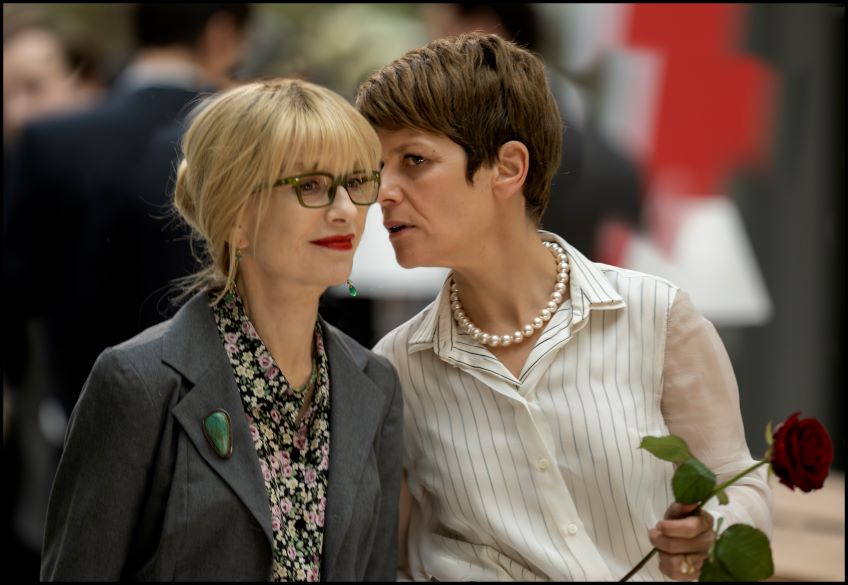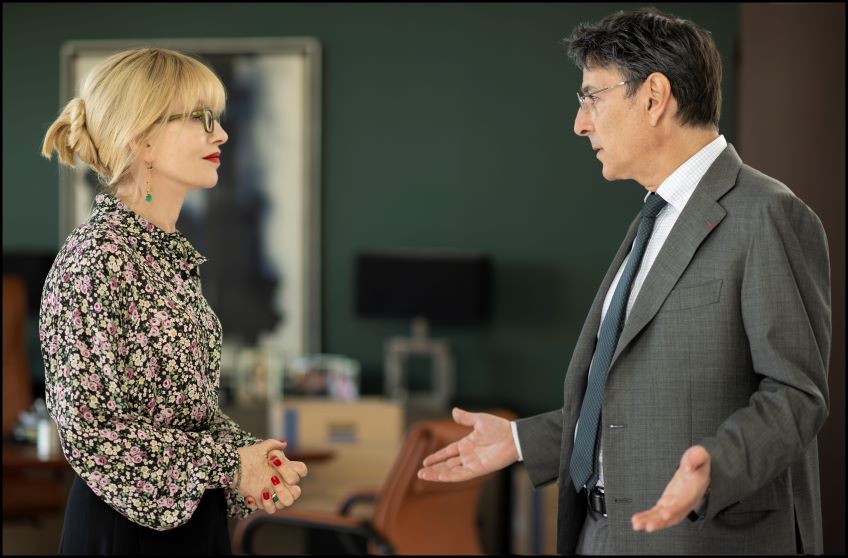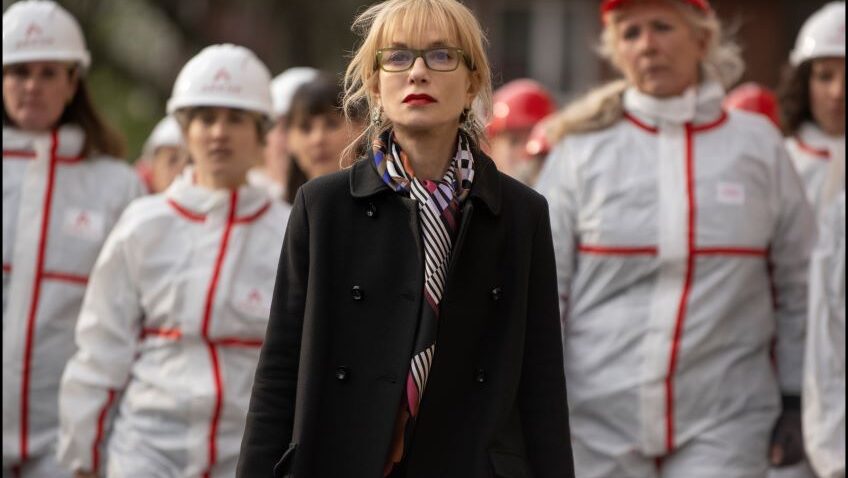Joyce Glasser reviews La Syndicaliste (June 30, 2023, Cert 15, 122 mins. In cinemas.
Sixty-three-year-old Jean-Pierre Salomé’s new film, La Syndicaliste, has echoes of his previous films like Playing Dead, The Chameleon and Female Agents with their theme of deceit, but more obviously, of American political thrillers like All the President’s Men and The Post. The literal translation, The Trade Unionist, wouldn’t be a catchy title in the UK today. But that is what Maureen Kearney (Isabelle Huppert) was when her whistle-blowing about EDF’s technology sharing contract with China turns her into a target and suspect. The proposed English title, The Sitting Duck, suggested a passive heroine. Isabelle Huppert (who starred in Salomé’s most recent film, Mama Weed) would be miscast as a passive heroine, and the real-life Kearney is anything but.
Salomé’s notable creative licence is turning Irish national Maureen Kearney, who began her career in France teaching English in a subsidiary of the French nuclear power company Areva, into a French woman. There are two good reasons for this licence: the story is complex and long enough without delving into Kearney’s backstory. And without worrying about accents, bankable star Isabelle Huppert could claim the title role.
Even without a wrinkle in sight (Huppert is slightly older than Kearney, who is now 66) Huppert’s face, not to mention her body language, expresses volumes. The most minute emotional changes are registered and the movement of her eyes saves half a page of dialogue. The way she stands, sits and walks provides information about the temperature of the character. Even her hair style (Kearney’s signature blond chignon) is a barometer of her state of mind.

Kearney lives with her good-humoured, supportive husband, Gilles (Grégory Gadebois) who works in the music industry, outside of Paris and they and their daughter enjoy a lakeside retreat where they plan to retire. It is a bit irksome that Kearney’s family and family life is not clarified, but other than knowing she had a maid and an old dog, it is not really important.
What is important to note is that Kearney is more attached to work than to the hearth. She is a workaholic and totally committed to her job. Buoyed by her feminist boss, Anne Lauvergeon (Marina Foïs), at nuclear power company Areva, Kearney is assertively protecting Areva’s union workers in France and around the world.
In early 2012, when the chronology of the story begins, Kearney has returned from Paks Nuclear Plant in Hungary where she was sent to sort out a dispute between an angry group of female employees who have just been sacked because “it’s easier to sack the women than the men”. Kearney reassures the women, ‘when I make promises, they’re not empty.’ She will get them their redundancy package.
Kearney returns to the Paris office where Anne Lauvergeon’s Deputy Director General, Luc Oursel (Yvan Attal) refuses to share Anne’s praise of Kearney’s mission. A discussion ensues. The stats show that the women are less productive and profitable. Kearney argues it is because they have more hours, less rest, and as a result have more accidents. Luc asks why the women do not consult a doctor. Kearney replies because they have no health care and are not given time off to go to a doctor. She knows her facts.
Anne asks Luc to do a study of the matter and present it to her at the next board meeting. Humiliated, he snarls, but is saved by political manoeuvring that sees Anne ousted in a complex power move initiated, it is suggested, by Nicholas Sarkozy in one of his last acts as French President.
The Hungarian argument is not the first time we see Maureen Kearney. In a harrowing prologue that occurs a few months after the incident in Hungary, indicating a causal link, Maureen is discovered by the family housekeeper, tied to a chair with signs of a brutal sexual assault. We will be returned to this assault later in the film.

When Lauvergeon finds herself a casualty of Sarkozy’s government and is replaced by the misogynistic fall-guy, Luc Oursel, the friction between Kearney and Oursel becomes palpable and well dramatised. Then, in one of those scenes straight out of 2019 Vietnam cover-up film The Report, an ex-employee of EDF, code-named Tirésias (Christian Hecq), approaches Kearney in cloak and dagger scene that catapults the tension way beyond office politics.
Tirésias presents Maureen with a leaked contract between EDF and the Chinese nuclear power group, CGNPC. Maureen is suspicious of his motives but when she scrutinises the contract (Kearney was a contract expert at this point in her career) she sees the ramifications for 50,000 French workers. Going over Oursel’s head, she brings the contract to the attention of Minister of Industry Arnaud Montebourg (Christophe Paou).
Then, just after a sinister phone call from EDF’s CEO, Henri Proglio (Bernard Gabay) and before a scheduled meeting with President Hollande, Kearney is sexually assaulted in her home: an attack that will turn the victim into a suspect. Whether or not the police set out to find holes in her story, even the audience begins to doubt Kearney and the plan to tarnish her reputation seems to be working.
You might know that Areva is now defunct as Kearney predicted, but not the background intrigue. Salomé opts for a straightforward, procedural style to tell this intricate story, that some may find a tad plodding. If it lacks flair, each of the many characters has a personality, if not an agenda, and the suspense builds with each twist, doubt and revelation.




